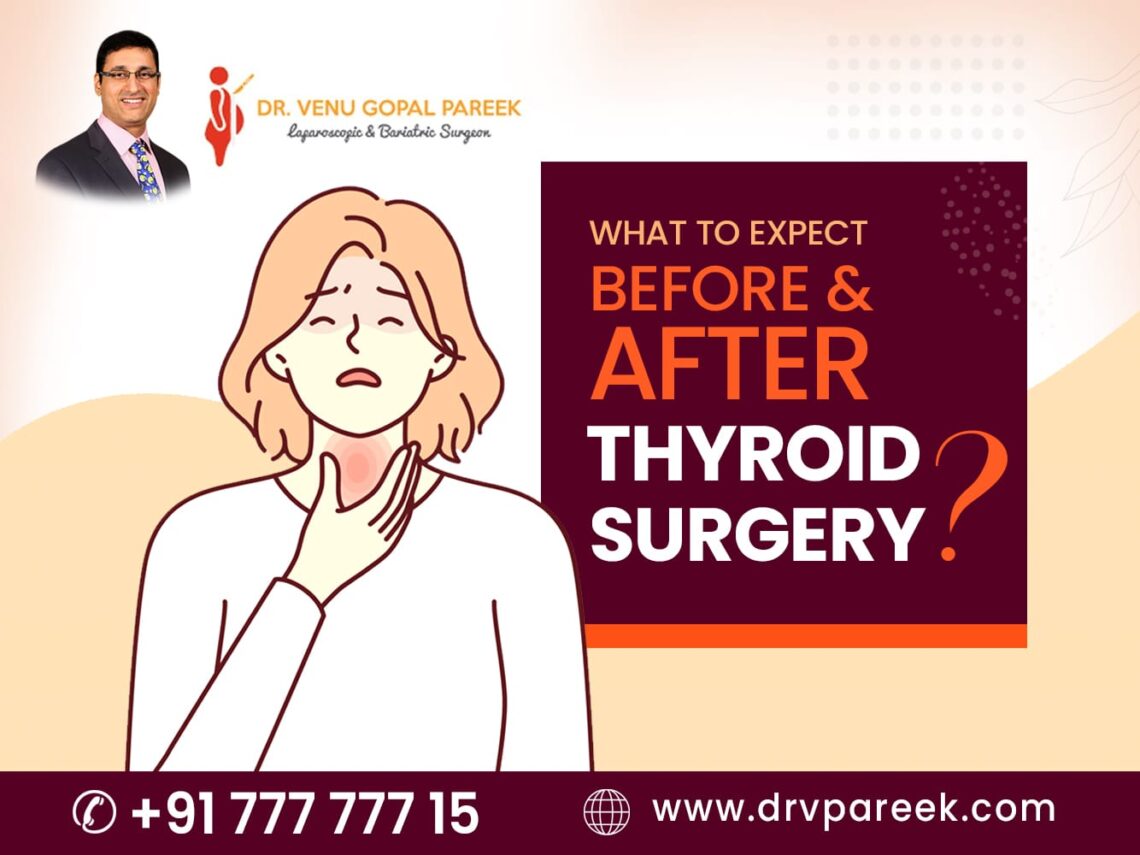
Thousands of people are suffering from thyroid problems around the world. Medication proves effective in treating thyroid problems, although, in some instances, surgery may be necessary as a viable treatment option.
So if your doctor suggested undergoing thyroid surgery, don’t worry, you are not alone in this experience. Around 2,50,000 thyroid surgeries are performed in India every year, showing that it is a common procedure recommended by doctors.
The thyroid gland, situated in the neck and resembling a butterfly, plays a vital role in maintaining overall health by producing essential hormones vital to the body’s functioning. So developing thyroid problems means having a big effect on your daily life.
The most prevalent thyroid conditions requiring surgery frequently are thyroid cancer, thyroid nodules, goitre, and hyperthyroidism.
Thyroidectomy
A thyroidectomy is the most common surgical procedure suggested for thyroid problems. The procedure involves removing the thyroid gland completely or a portion of it, depending on the severity of the thyroid condition. There are two different approaches to carrying out thyroidectomy, which include open surgery (also called the traditional approach) and the endoscopic approach.
If you are having thyroid surgery, it is essential to educate yourself so that you may best prepare for the treatment and know what to expect during the recovery period. This covers all the necessary pre-surgical tests and post-operative care instructions to increase the likelihood of a successful outcome.
What to expect before thyroid surgery?
Once your thyroidectomy is scheduled, you will have a pre-operative evaluation by the surgical team. The evaluation includes blood tests, scans, and some physical tests. These tests help you get crucial information about your thyroid function and overall health status.
To assess the current status of your thyroid hormone levels and other vital factors like platelet counts, your blood levels will be monitored and evaluated. Measuring your platelet count helps in determining the potential risk of bleeding complications both during and after surgery.
Before surgery, you may also need to undergo imaging scans like CT scans and MRIs to evaluate the condition of your thyroid gland. These scans offer valuable data on the condition of your thyroid, contributing to the planning and preparations for the operation. To evaluate your vocal cords, the surgeon may conduct an examination using a laryngoscope, which helps to look inside your mouth.
In order to maintain hormone balance throughout surgery, doctors recommend thyroid medications for hyperthyroid patients. This step helps to prevent hormonal imbalance after the removal of your thyroid gland.
Your doctor might also insist you — when you should stop eating and drinking before surgery. It is usually advised that patients stop eating or drinking for 8 to 12 hours before undergoing surgery.
What to expect after thyroid surgery
Once your surgical procedure is finished, you will be moved to a recovery room where the doctors will monitor your condition carefully. Once the anaesthesia effect has reduced, you will be moved to a general room, where you may need to stay for one or two days for further observation and monitoring. The possibility of patients being discharged on the same day of surgery varies and depends on some factors, like the patient’s stability and the specific surgical approach used.
After surgery, it is common for the patient to have a hoarse voice, but this does not necessarily mean permanent damage to your vocal cords. Although vocal cord injury is a potential complication, post-surgical hoarseness in the voice is often due to throat irritation resulting from the placement of a breathing tube during the procedure.
Most patients who undergo laparoscopy experience minimal pain after surgery. They are also able to recover quickly and get back to their regular activities within a week. However, to continue with your strenuous activities like heavy lifting or vigorous exercise, you may need to wait at least two weeks.
The fading of your scar may take approximately a year. Applying sunscreen regularly to the scar can aid in gradually reducing its appearance.
Taking the initiative to educate yourself about your condition and the procedure to treat it is an excellent first step to reducing stress. Acquiring knowledge beforehand will also encourage you to ask any important questions to your doctor, ensuring a clear understanding of the pre and post-surgical processes and alleviating any uncertainties.
To ensure a successful thyroid surgery, it is crucial to place your trust in a skilled team of doctors as one of the primary deciding factors. Dr. Venugopal Pareek, the best laparoscopic surgeon for thyroid problems, has a diverse team of skilled surgeons who can ensure a successful thyroid surgery with minimal risk of complications. Book an appointment to meet the doctor today.







